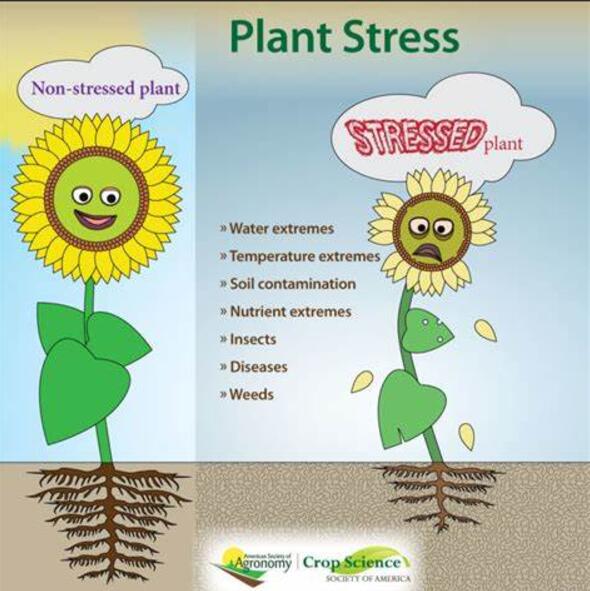Rhizosphere microbiomes altered by environmental stresses and agronomic practices: Implications for plant adaptation and soil biogeochemical processes
IF 6.8
Q1 PLANT SCIENCES
引用次数: 0
Abstract
The soil microbiome is increasingly recognized not merely as a respondent to its environment, but as an active engineer of soil health and plant resilience. However, while most research focuses on how agronomic practices and environmental stresses alter microbial communities, the reciprocal feedback, how these reshaped microbiomes in turn modify critical soil properties, remains a key knowledge gap. This review synthesizes recent literature to bridge this gap, systematically connecting external pressures (stresses and practices) to the resulting impacts on soil biogeochemistry via the plant-microbe nexus. Our analysis reveals three main findings: (1) Under stress, plant precisely tailor root exudate chemistry to recruit specific microbial allies capable of enhancing stress tolerance. (2) This functionally distinct microbiome then actively re-engineers the soil, measurably improving soil aggregation, carbon sequestration, and nutrient availability. (3) Agronomic practices, such as no-till and cover cropping, serve as powerful tools to steer these interactions, creating a positive feedback loop that builds long-term soil fertility. We conclude that managing this plant-microbe-soil feedback system is fundamental for developing agricultural strategies that simutaneously boost crop productivity and regenerate soil health.
环境胁迫和农艺措施改变的根际微生物群:对植物适应和土壤生物地球化学过程的影响
土壤微生物群越来越被认为不仅是对其环境的反应,而且是土壤健康和植物恢复力的积极工程师。然而,虽然大多数研究集中在农艺实践和环境压力如何改变微生物群落,但相互反馈,这些重塑的微生物群落如何反过来改变关键的土壤性质,仍然是一个关键的知识空白。这篇综述综合了最近的文献来弥补这一差距,系统地将外部压力(压力和实践)与通过植物-微生物关系对土壤生物地球化学产生的影响联系起来。结果表明:(1)在逆境下,植物可以精确地调整根系分泌物的化学成分,以招募能够增强抗逆性的特定微生物盟友。(2)这种功能上独特的微生物群会主动改造土壤,显著改善土壤团聚、碳固存和养分有效性。(3)农艺实践,如免耕和覆盖种植,是引导这些相互作用的有力工具,创造了一个建立长期土壤肥力的正反馈循环。我们的结论是,管理这种植物-微生物-土壤反馈系统是制定同时提高作物生产力和恢复土壤健康的农业战略的基础。
本文章由计算机程序翻译,如有差异,请以英文原文为准。
求助全文
约1分钟内获得全文
求助全文
来源期刊

Plant Stress
PLANT SCIENCES-
CiteScore
5.20
自引率
8.00%
发文量
76
审稿时长
63 days
期刊介绍:
The journal Plant Stress deals with plant (or other photoautotrophs, such as algae, cyanobacteria and lichens) responses to abiotic and biotic stress factors that can result in limited growth and productivity. Such responses can be analyzed and described at a physiological, biochemical and molecular level. Experimental approaches/technologies aiming to improve growth and productivity with a potential for downstream validation under stress conditions will also be considered. Both fundamental and applied research manuscripts are welcome, provided that clear mechanistic hypotheses are made and descriptive approaches are avoided. In addition, high-quality review articles will also be considered, provided they follow a critical approach and stimulate thought for future research avenues.
Plant Stress welcomes high-quality manuscripts related (but not limited) to interactions between plants and:
Lack of water (drought) and excess (flooding),
Salinity stress,
Elevated temperature and/or low temperature (chilling and freezing),
Hypoxia and/or anoxia,
Mineral nutrient excess and/or deficiency,
Heavy metals and/or metalloids,
Plant priming (chemical, biological, physiological, nanomaterial, biostimulant) approaches for improved stress protection,
Viral, phytoplasma, bacterial and fungal plant-pathogen interactions.
The journal welcomes basic and applied research articles, as well as review articles and short communications. All submitted manuscripts will be subject to a thorough peer-reviewing process.
 求助内容:
求助内容: 应助结果提醒方式:
应助结果提醒方式:


